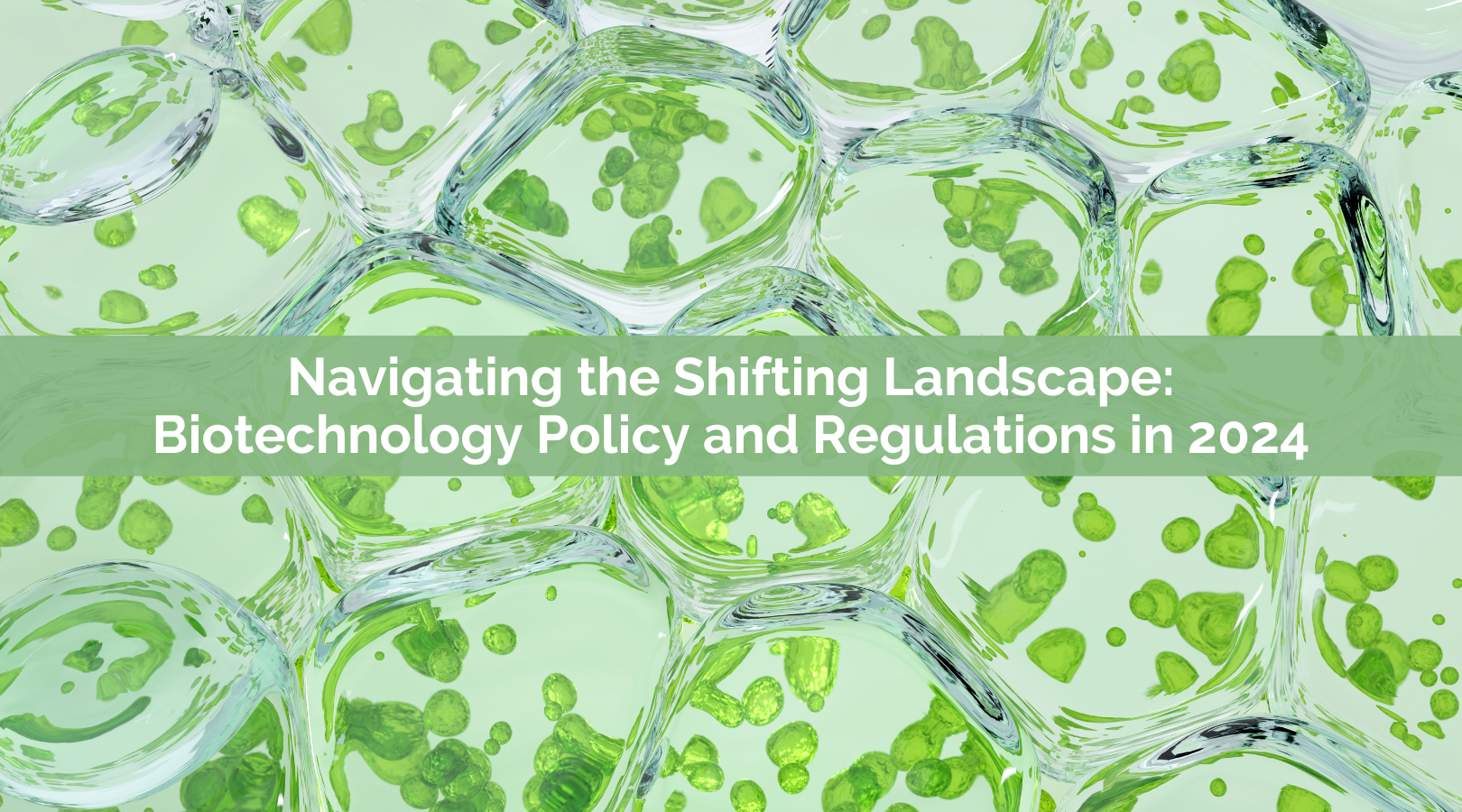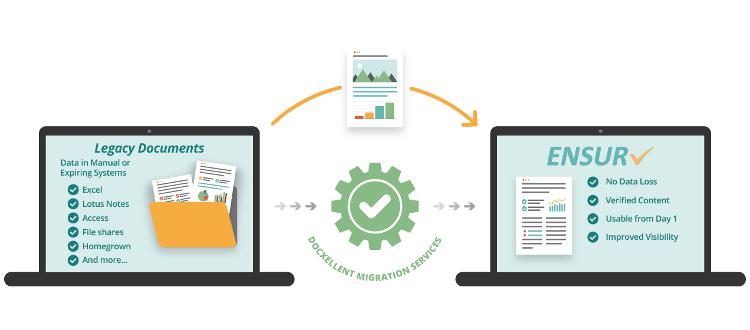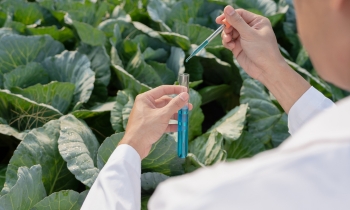
Biotechnology, a frontier of scientific innovation, finds itself at the crossroads of policy and regulation in 2024. The rapid evolution of technologies like CRISPR, synthetic biology, and artificial intelligence (AI) is reshaping the industry, prompting a critical examination of existing frameworks. The global biotech market is on an upward trajectory, projected to reach a staggering $762.4 billion by 2027, with a compound annual growth rate (CAGR) of 7.1%.
As the biotech and life science sector thrives and financial inflows surge, the intersection of innovation, ethics, and policy becomes increasingly complex. This blog will explore the policy trends emerging in 2024 and their far-reaching implications for businesses, providing a comprehensive guide to navigating this dynamic landscape. In the midst of this transformative era, where biotech innovations hold immense promise, understanding the regulatory nuances becomes crucial for companies aiming to thrive responsibly and sustainably.
Emerging Biotech Policy Trends
1. Synthetic Biology Takes Shape
Synthetic biology, once relegated to the realm of science fiction, has rapidly transformed into a tangible reality. This exciting technology empowers us to manipulate life at the molecular level, with the potential to address some of humanity's most pressing challenges. From self-healing materials to sustainable biofuels, the possibilities seem limitless.
However, this immense power comes intertwined with crucial considerations. Ensuring the safety and ethical use of these "designer organisms" demands a multifaceted approach.
Firstly, biosecurity emerges as a paramount concern. Unforeseen consequences, accidental releases, and the potential for misuse necessitate robust regulations, rigorous risk assessments, and unyielding transparency. Only through meticulous oversight and stringent safety protocols can we navigate this delicate terrain.
Beyond immediate safety, we must ensure environmental sustainability. Synthetic biology holds a lot of potential, but it must be harnessed responsibly. Closed-loop systems, sustainable practices, and thorough life-cycle analyses are essential to protect our planet from resource depletion and ecological harm. Greening this revolution is not just an option, it's an imperative.
Furthermore, as we delve deeper into the very code of life, there are many ethical considerations. Designer pathogens, unforeseen mutations, and the very boundaries of this technology demand open dialogue, public engagement, and international collaboration. Establishing ethical frameworks and responsible guidelines, while fostering open communication, is crucial to ensuring this powerful technology serves humanity for good.
2. CRISPR Crossroads
The landscape of clinical trials is undergoing a revolutionary shift with over 750 trials worldwide leveraging CRISPR gene editing technology going into 2024, according to CRISPR Therapeutics. This proliferation reflects the widespread adoption and exploration of CRISPR's potential applications across various medical fields.
As CRISPR technology advances, ethical considerations take center stage. A 2022 survey by the Pew Research Center revealed that a significant 74% of Americans support the implementation of regulations specifically governing CRISPR editing in human embryos. This strong public sentiment emphasizes the need for an ethical framework in this field.
3. Biomanufacturing Under the Microscope
The biomanufacturing sector faces increased scrutiny in 2024. Biomanufacturing, with its promise of revolutionizing medicine and materials, often churns out complex products demanding resource-intensive processes. This leads to lots of questions about its carbon footprint, waste generation, and energy consumption. Safety, too, is a paramount concern. Biomanufacturing facilities, handling often potent biological materials, must have robust safeguards in place to prevent accidents, leaks, or even deliberate misuse. And then there's the specter of fragility. A disrupted supply chain, whether due to geopolitical shifts or natural disasters, can bring biomanufacturing's delicate dance to a grinding halt.
Proactive adaptation is the only viable step for biotech companies in this scenario. Sustainability initiatives – closed-loop systems, renewable energy sources, green chemistry – must be woven into their operations. Compliance with evolving safety regulations, rigorous training, and incident preparedness drills are no longer optional but essential.
However, a biomanufacturing landscape built on the pillars of environmental responsibility, unwavering safety, and supply chain resilience is not only ethically sound but also economically advantageous. Consumers, increasingly conscious, will gravitate towards brands that walk the talk, and investors will prioritize those mitigating risks and demonstrating long-term viability.
Failure to adapt is to risk irrelevance, not just in 2024, but in the years to come. But for those who rise to the challenge, who weave sustainability, safety, and resilience into their biomanufacturing practices, the future holds promise. They will not only shape the world with their innovations but also do so responsibly, leaving a legacy not just of progress, but of a healthier planet and a more secure future for generations to come.
4. AI in Drug Discovery: A Balancing Act
Artificial intelligence is poised to revolutionize drug discovery, not only by accelerating research but also by slashing timelines and costs. Studies estimate that AI could shrink development timeframes by 20-30% and halve associated expenses (McKinsey & Company, 2020). This rapid prototyping and cost-efficiency hold immense promise for bringing lifesaving medications to patients faster and more affordably.
However, this transformative potential comes intertwined with critical ethical considerations. A recent report from MIT Technology Review (2023) raises concerns about potential bias and lack of transparency lurking within AI algorithms used for drug discovery. These issues threaten to skew research outcomes and raise questions about fairness and accountability.
Integrating AI into biopharmaceutical research demands leveraging its tremendous potential for innovation while simultaneously addressing ethical concerns head-on. This necessitates robust safeguards against bias in algorithms, ensuring transparency in their decision-making processes, and prioritizing data privacy to protect patient information. Only by striking this delicate balance can we harness the power of AI to revolutionize drug discovery responsibly and ethically.
5. Lab-grown Meat: From Hype to Reality
The promise of sustainable and cruelty-free lab-grown meat is becoming a reality, but regulatory frameworks are struggling to keep pace. Defining standards for safety, labeling, and consumer acceptance requires a delicate and informed approach. Biotech firms entering this space must navigate these uncharted waters, balancing innovation with meeting regulatory expectations to establish a trustworthy market presence.
6. Data Privacy Takes Center Stage
As data-driven technologies seep into every corner of biotech, so too do concerns about data privacy. Biotech companies amass mountains of sensitive information: genetic sequences, medical records, and even facial and behavioral data gleaned from wearables. This digital goldmine fuels cutting-edge research and personalized medicine, but it also raises a potent question: who owns this data, and how is it protected?
The answer, in 2024, is increasingly shifting towards stringent regulations. Fueled by public outcry and data breaches exposing millions of records, regulatory bodies are flexing their muscles. The EU's General Data Protection Regulation (GDPR) already casts a long shadow, and similar laws are sprouting across the globe. In the US, the California Consumer Privacy Act (CCPA) and its cousin, the Virginia Consumer Data Protection Act (VCDPA), are just the tip of the iceberg.
Compliance won't be a walk in the park. These regulations demand robust data privacy measures. Secure servers, rigorous access controls, and encryption for sensitive data become non-negotiables – in addition to transparency. Individuals must know what data is collected, how it's used, and who they can share it with. And control lies with the individual: the right to access, rectify, delete, and even sell their data becomes a fundamental right, not a privilege.
But embracing this data privacy paradigm shift isn't just about ticking regulatory boxes; it's about building trust. Surveys paint a stark picture: a 2023 Pew Research Center poll found that 78% of Americans worry about the privacy of their genetic data. Consumers are choosing brands that prioritize data security, and investors are wary of companies embroiled in data breaches. Trust, once lost, is hard to regain.
For biotech companies, this is a double-edged sword. Implementing robust data privacy measures isn't cheap, but the cost of inaction is far greater. Data breaches tarnish reputations, erode trust, and invite hefty fines. Conversely, building a reputation for data stewardship attracts ethically conscious consumers, opens doors to global markets, and fosters long-term partnerships.
Implications for Businesses
1. Compliance Challenges
The evolving nature of biotech regulations poses significant compliance challenges. Companies must maintain vigilance, staying up to date with regulatory updates and adapting swiftly to avoid legal pitfalls. It’s very important to create a proactive compliance culture across all levels of the organization.
2. Market Access Hurdles
Global market access is becoming increasingly complex due to varying international regulations. Biotech firms need to engage proactively with regulatory bodies to navigate these hurdles, ensuring a smooth market entry and establishing a global presence while complying with diverse regulatory requirements.
3. Research and Development Landscape
Shifting policies directly impact the research and development (R&D) landscape. Biotech firms must align their research initiatives with emerging trends, fostering innovation without compromising compliance. This requires a strategic approach to R&D that anticipates regulatory shifts and adapts swiftly to capitalize on new opportunities.
4. Operational Adaptations
Biotech companies must reassess their operational models to meet evolving regulatory expectations. This involves upgrading infrastructure, implementing new protocols, and fostering a culture of compliance within the organization. By integrating regulatory considerations into day-to-day operations, companies can navigate shifts seamlessly.
5. Risk Management Strategies
In a dynamic regulatory environment, effective risk management is crucial. Companies should develop robust risk assessment frameworks to anticipate and mitigate potential challenges, safeguarding their reputation and bottom line. This includes scenario planning, regulatory intelligence, and continuous monitoring to stay ahead of potential risks.
Strategies for Biotech Success
1. Stay Informed:
Continuous monitoring of policy developments is imperative. Establishing channels for regular updates and staying engaged with industry forums, regulatory agencies, and scientific publications will enable proactive adaptation to regulatory changes.
2. Develop a Compliance Plan:
A comprehensive compliance plan is non-negotiable. This involves not only understanding current industry regulations but also forecasting potential changes and implementing systems to ensure adherence across all facets of operations. Regular compliance audits and training programs are integral components of this strategy.
3. Advocate for Innovation:
Engage with policymakers to advocate for innovation-friendly policies. Collaborate with industry peers, research institutions, and advocacy groups to collectively contribute to the development of regulatory frameworks that foster progress while addressing societal concerns. Actively participating in public discussions and consultations can help shape the regulatory landscape.
4. Embrace Technology:
Leverage technology to streamline compliance processes. Automation, advanced analytics, and blockchain technologies can enhance efficiency, ensuring that regulatory requirements are met without stifling innovation. Integrating technology into compliance frameworks also facilitates real-time monitoring and reporting.
5. Seek Expert Guidance:
In a complex regulatory landscape, seeking expert advice is invaluable. Collaborate with legal experts, regulatory consultants, and industry associations to navigate the intricacies of biotech policy. Developing a network of experts provides access to up-to-date information and diverse perspectives, enhancing the company's ability to navigate regulatory challenges.
Adapt to Emerging Biotech Industry Trends
The biotechnology landscape in 2024 is marked by rapid advancements, ethical considerations, and a regulatory landscape in flux. Companies that proactively navigate these shifts will not only ensure regulatory compliance but also position themselves as leaders in shaping the future of biotechnology. Embracing change, staying informed, and actively participating in the dialogue surrounding biotech policies are essential steps toward sustainable growth and innovation.
Don't just witness the biotech revolution – be a part of shaping it. Embrace change, stay informed, and actively participate in the dialogue surrounding policies. And while you chart your course, let DocXellent be your guide.
Contact us today and discover how the ENSUR document management system can equip your company to dance with the future of biotechnology with grace, agility, and unwavering commitment to both progress and responsibility.
.png?width=4000&height=600&name=Blog%20Author%20Headers%20(4).png)
Rob joined DocXellent as a Senior Consultant in the Customer Relations department, where he leverages his expertise in project management, support, and ENSUR as a subject matter expert. With a bachelor's degree in Operations Management from Rhode Island College, Rob spent the initial years of his career in the transportation and supply chain industry. Learn more about Rob here.





























